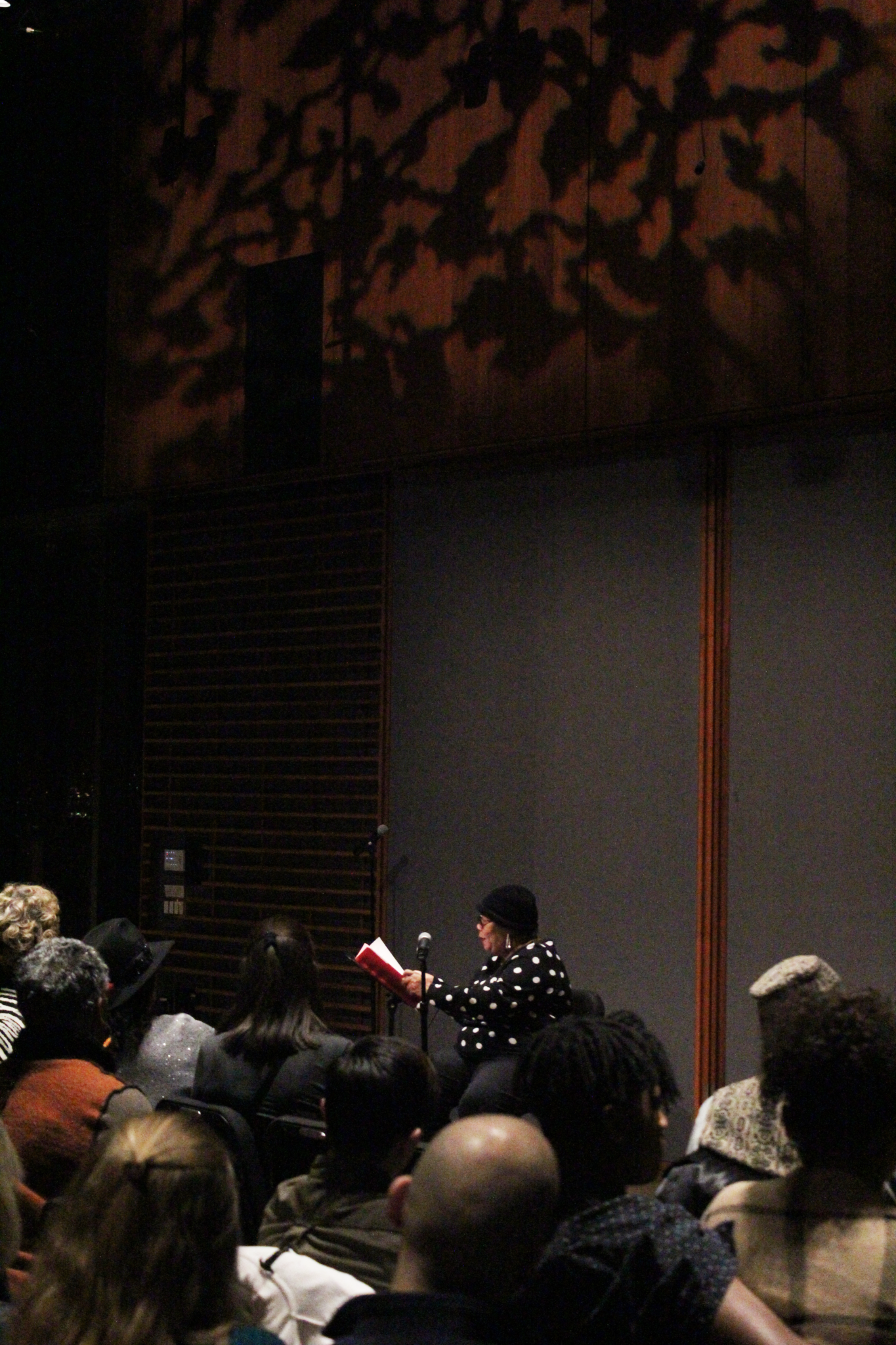On January 7, a chorus of voices sang tribute to the beloved Chicagoan poet, Gwendolyn Brooks. Their hushed Logan Center audience heard selections from the new anthology Revise The Psalm, a collection of works celebrating Brooks’s life, published by Curbside Splendor this month to commemorate Brooks’s one-hundredth birthday.
In co-editor Quraysh Ali Lansana’s introduction, he puts forward the proposition that voice comes from what an artist has internalized. If this is true, Revise the Psalm is a book by writers who have internalized the work and philosophy of Gwendolyn Brooks. Lansana’s introduction also suggests their works in celebration of Brooks are essentially “covers” of her work. In the book, no single one of the ninety-one contributing “cover artists” is given an extended solo. Instead, the voices—some as established as Rita Dove, others more contemporary, like CM Burroughs—occur and recede, giving the reader the impression that all artists are present simultaneously over the course of the book. It is inclusive, much like the woman it celebrates.
The event’s first reader was the multiple award-winning Angela Jackson, a native South Sider and lifetime admirer of Gwendolyn Brooks’s work. One of the poems she read, entitled “The UnMother,” is found in Part One of Revise the Psalm, a section devoted, in Lansana’s words, to motherhood. Every section in the anthology is collected around a theme from Gwendolyn Brooks’s work: Part Three concerns heartbreak, for example. As Jackson read her poem, she savored each word as she encountered it, as if she were steadily composing the poem as she spoke it. After Jackson finished, the crowd sighed in unison with pleasure and admiration. One of the first poems in the book, “The UnMother” is an homage to Brooks’s 1963 poem “the mother,” and echoes the cadence of its inspiration.
That 1963 poem also serves as the writing prompt for the first poem in Revise the Psalm, “Child-free.” Written by Joan Wiese Johannes, the poem was composed using poet Terrance Hayes’s “Golden Shovel” technique. As explained by CM Burroughs, who read Johannes’s poem, a Golden Shovel is created by taking the words from an existing line of poetry and using each word as the end-word in the line of a new poem. As she read and relished Johannes’s work, Burroughs’s heart was full; her voice slightly wavered and her eyes welled up. Contributors to Revise the Psalm are justifiably proud of their company.
Part Three of the anthology contains Burroughs’s original work, “To Be In Love,” whose catching line structure evokes the repeated coming-apart and coming-together that leads to the “golden hurt” of love. This section also includes work by Elise Paschen, the second poet to read at the January 7 release party. The eighth part of the anthology comprises personal “memories and impressions” of Gwendolyn Brooks, written by contributors whose work appears earlier in the book. Here Paschen references a note given to her by Brooks before the birth of her first child. At the Logan Center, she brought out the note, to some of the night’s loudest applause: “It’s Almost time for the BABY! =Blessings on you ALL!!! Love, Gwen Brooks.”.
Revise the Psalm is full of dear memories of Brooks’s care and enthusiasm; they provide much of the book’s emotional impact by bringing Brooks to life. Lansana’s story about meeting Brooks in 1993 and attending her last writing workshop at Chicago State University in 1997 paints a vivid picture of Brooks the teacher. In Part Seven Lansana even shares photocopied manuscripts with Brooks’s praise written in large cursive across the page. Reciprocating Brooks’s goodwill, many contributors to Revise the Psalm call her a close friend. Before reading her work, Angela Jackson told a personal anecdote, not present in the book, about Brooks’s overflowing generosity as the judge of a contest for South Side youth writers. For that contest, Jackson said, Brooks paid for all prizes out of her own pocket: “That was the kind of person she was.”
The excellent Khari B., introduced by Lansana as “the stalwart,” gave the last performance of the night. Pacing across the length of the stage, he performed “A Depraved Indifference 2 Human Life,” a harrowing and heartfelt contribution to the politically themed fifth part of Revise the Psalm. Vast in scope, the piece compares police gun violence to the greatest atrocities in human history. The performance brought the words on the page to vivid, explosive life; the audience was so captured it scarcely breathed. Gwendolyn Brooks counted Khari B. among her favorite poets—though she undoubtedly had many—and it was thrilling to hear him describe his impression of the young Brooks as an “It Girl” who led not only by artistic example but by her lifestyle as well. Revise the Psalm leaves a staggering impression of the breadth of Brooks’s influence —the famous photograph taken by Roy Lewis is only one of the beautiful reproductions in an “Artwork” section of the book that illustrates the influence Brooks had on the visual arts. This influence is seen from the very beginning of the anthology—the crisp woodcut portrait on the cover is a reproduction of a 2001 work by Dirk Hagner.
What’s next for Revise the Psalm? A review in The New York Times, as Lansana announced just before readings began. The Times’s review will be momentous, since anthologies are rarely given a review. Reacting to this news, the audience clapped and rejoiced like proud parents. During her life, Gwendolyn Brooks sang the merit of the literary voices living in Chicago; now, in a resounding chorus, those voices are singing back.
Did you like this article? Support local journalism by donating to South Side Weekly today.


